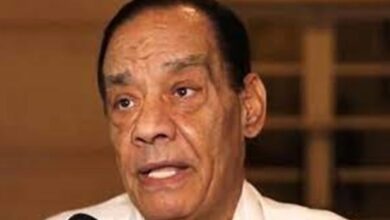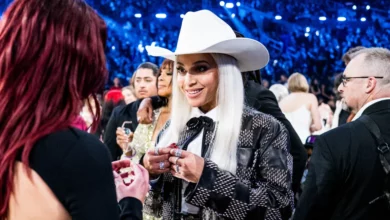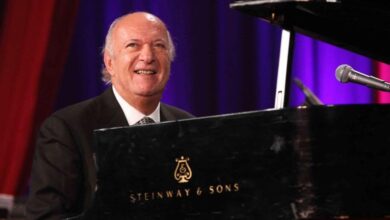Iconic Lebanese music composer Ziad Rahbani arrived in Cairo today to participate in the second Cairo International Jazz Festival. A press conference announcing the event was held at the Semiramis Intercontinental Cairo. Among the panel was Amro Salah, manager of the Egyptian Eftekasat troupe and organizer of the festival, as well as Rahbani, who will play for the first time in Egypt and is to be honored this year at the festival.
Rahbani, the son of Lebanese contemporary music legends Fairouz and Assi Rahbani, created a musical niche of his own with his rebellious tunes, satirical lyrics and political commentary, since first writing his musical, Sehraya, in 1973. A composer, pianist, performer and playwright, the musical icon will perform on the first night of the jazz festival (11-15 March).
During the press conference Rahbani, displaying his radiant wit and sense of humor, both of which are reflected in his music, noted that despite playing several types of music, his genre is commonly mistaken for jazz, to the extent that "we eat jazz and our color is jazz"–as if jazz is in fashion these days. Not only that, but he is often mistaken for playing oriental jazz: "Two words that are two mistakes: ‘oriental’ gives the feeling of tabla or orientalist misconceptions, and ‘jazz’ simply means cross-borders music," said Rahbani to the audience of journalists from across the world.
Asked how he viewed a campaign by Egyptian intellectuals to grant him Egyptian nationality, Rahbani smiled and said that since this is his first time in Egypt, maybe Egyptians should get to know him first. "It is true that I am a Rahbani and I am also Egyptian in culture at least, and I was raised with so many stories that had Egypt as their title. And as a musician I was affected by Sayed Darwish and other great Egyptian composers," said Rahbani, who went on to explain that there was a bond between the Rahbanis and Egyptian music icon Sheikh Said Darwish, whose music Rahbani grew up listening to.
Rahbani agrees that his involvement in politics might have cost him commercial success, but says he was never concerned with the commercial artistic scene. As for the golden era of music, Rahbani believes that this was during the seventies and that people are until now adapting the tunes of that decade.
Finally, Rahbani said that the real honor for him was acknowledgment by the media, which allows him to communicate with his audience. He concluded by saying that what encouraged him to participate in the jazz festival is the fact it stands against what is presented commercially, and in a manipulative way, as main-stream music. "But the public is much more refined […] and this festival presents a much simpler and more genuine music," Rahbani said.




